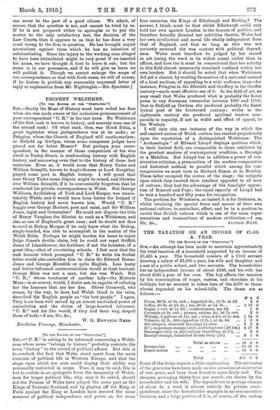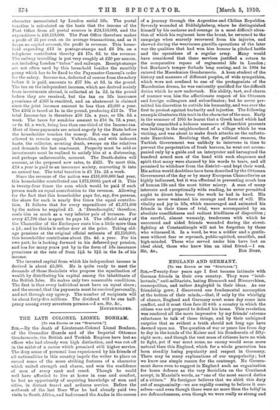THE TAXATION ON AN INCOMF/ OF £1,425 A YEAR.
[To THE EDITOR Or PRE " SPECTATOR:1
••• ••• ••• • ••
Income-tar Death-duties
0011 •• •
• •
SIR,—An attempt has been made to ascertain approximately the total taxation of a household supported by an income of £1,425 a year. The household consists of a Civil servant
drawing a salary of £1,000 a year, his wife and daughter and a son at a public school, and two servants. The householder has an independent income of about £240, and his wife has about £185 a year of her own. The boy affects the taxation by his consumption of sugar, raisins, and chocolate in his holidays, but no account is taken here of the £170 or there- abouts expended on his school-bills. The items are as follows :— Cocoa, 28 lb. at 3s. cwt. ; imported do., 12 lb. at 2d. Coffee, 60 lb. at 2d. lb.; tea, 60 lb. at 5d. lb....
Sugar, 1 cwt. at ls. 2d. ; confectionery, say 6d. ... Currants at 2s. cwt. ; prunes, raisins, &c., at 7s. cwt. Whisky, 2 gallons at lls. gal. ; wine, 4 doz. at 3s. doz. Tobacco, 41 lb., 600 cigarettes (2 lb.), at 3s. 8d. ... 400 cheques, Armorial Bearings License ...
25% on postage-stamps (413), and telephone (X6 10a.) Passenger-duty on £20 railway travelling, at 210 Receipt-stamps, Inhabited House Duty (.23) Total as above ... ... 16 8 9 ... 50 12 0 ... 14 0 0
Total £81 0 9
Some of the items require a little explanation. The estimates of the groceries have been made on two occasions at an interval of two years, and have been found to agree fairly well. The cheques, averaging thirty-four per month, are drawn by the householder and his wife. The expenditure in postage-stamps of about 5s. a week is almost entirely for private corre- spondence, since the householder engages in no remunerative business, and a large portion of it is, of course, of the useless A a.
2
1 15 1
2 1 14
1 3 8 3 4 17
8 3 1
a. 9 0
8 0 0 0 4 6 O 6
character necessitated by London social life. The postal taxation is calculated on the basis that the income of the Post Office from all postal sources is £24,156,000, and the expenditure is 218,113,000. The Post Office therefore makes a profit of 25 per cent. on its average transactions, and as it keeps no capital account, the profit is revenue. This house- hold expending £13 in postage-stamps and £6 108. on a telephone contributes thereby £4 17s. 6d. to the revenue. The railway travelling is put very roughly at £20 per annum, , of including London " tubes " and railways. Receipt-stamps are not often used by this household besides the monthly penny which has to be fixed to the Paymaster-General's order for the salary. Income-tax, deducted of course from the salary before it is paid, amounts to £37 10s. at 9d. in the pound. The tax on the independent incomes, which are derived mainly from investments abroad, is collected at ls. 2d. in the pound before they are received, but the tax on life insurance premiums of £163 is remitted, and an abatement is claimed since the joint incomes amount to less than £2,000 a year. The £262 is taxed at le. in the pound, producing £13 2s. The total Income-tax is therefore £50 128. a year, or 19s. 5d. a week. The taxes for sundries amount to £16 9s. 7d. a year, or 6s. 4d. a week, being less than one-third of the Income-tax. Most of these payments are seized eagerly by the State before the householder touches the money. But one tax alone is allowed to remain unpaid. Vulture-like, and with indecent baste, the collector, scenting death, swoops on the relatives and demands the last exactment. Property must be sold or investments must be realised to satisfy him at a distressing, and perhaps unfavourable, moment. The Death-duties will amount, at the proposed new rates, to £425. To meet this, £14 a year is paid to an insurance society, converting it into an annual tax. The total taxation is £1 ns. 2d. a week.
Since the revenue of the nation was £151,600,000 last year, this householder contributed one 1,871,000th part of it. This is twenty-four times the sum which would be paid if each person made an equal contribution to the revenue. Allowing for the fact that this householder pays for, say, five persons, the share for each is nearly five times the equal contribu- tion. It follows that for every expenditure of £1,871,000 by the nation he supplied £1. A ' Dreadnought,' therefore, costs him as much as a very inferior pair of trousers. For every £7,796 that is spent he pays ld. The official salary of the Chancellor of the Exchequer costs him a little more than a id., and he thinks it rather dear at the price. Taking old- age pensions at the original official estimate of £2,110,000, this householder contributes about 21s. 4d. a year. For his own part, he is looking forward to his deferred-pay pension, and has for many years put by in the form of life insurance premiums at the rate of from lid. to ad. in the ls. of his income.
The invested capital from which his independent income is derived is about £5,360. He is quite ready to meet the demands of those Socialists who propose the equalisation of wealth by distributing his capital among the inhabitants of the British Isles. He makes only two reasonable conditions. The first is that every individual must have, an equal share ; and the second, that the payments must be received personally, and not through any agency. The number of recipients will be about forty-five millions. The dividend will be one half- penny among every seventeen persons.—I am, Sir, &c.,
HOUSEHOLDER.















































 Previous page
Previous page